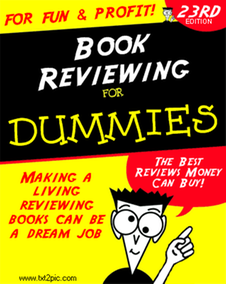Book Reviewing for Dummies by Todd Rutherford (Wiley, $17.95 paperback, 97804702460, April 1, 2013)
 For many readers and writers, making a living reviewing books can be a dream job. And as more and more opportunities develop to offer opinions, especially online, the market for skilled book reviewers is growing. In the 23rd edition of Book Reviewing for Dummies, prolific reviewer Todd Rutherford starts with the basics: Read a book and then think about whether you liked it; this is called "forming an opinion." Depending on where the review will be published, the reviewer may need to back up his or her "opinion" with actual facts. Rutherford recommends making notes as you read the book you will be reviewing. This can be done, he instructs, using technology, such as small pieces of paper called "sticky notes." (This won't work as well, however, if you're reading the book on a screen of some sort.) This note-taking process will help the reviewer distill a whole bunch of information into a few pithy words.
For many readers and writers, making a living reviewing books can be a dream job. And as more and more opportunities develop to offer opinions, especially online, the market for skilled book reviewers is growing. In the 23rd edition of Book Reviewing for Dummies, prolific reviewer Todd Rutherford starts with the basics: Read a book and then think about whether you liked it; this is called "forming an opinion." Depending on where the review will be published, the reviewer may need to back up his or her "opinion" with actual facts. Rutherford recommends making notes as you read the book you will be reviewing. This can be done, he instructs, using technology, such as small pieces of paper called "sticky notes." (This won't work as well, however, if you're reading the book on a screen of some sort.) This note-taking process will help the reviewer distill a whole bunch of information into a few pithy words.
Before embarking on what will surely be a lucrative career as a book reviewer, Rutherford suggests studying the work of successful book review professionals like Michiko Kakutani, Harriet Klausner and Ron Charles for tips on style and vocabulary. Practice using key terms like limn, lyrical, poignant and tour-de-force in everyday conversation. And he quotes the philosopher Crash Davis: "You're gonna have to learn your clichés. You're gonna have to study them, you're gonna have to know them. They're your friends."
When writing a review, Rutherford emphasizes, it is often important to be balanced. This means that for every nice thing you say, you must also write something mean. There are exceptions to this, of course; if you're writing a paid review for Amazon, for example, you'll want to be really, really positive. Exclamation points can help you get your message across, and there's a whole chapter on how and when to use them!
For this revised updated 23rd edition, Rutherford has added an extensive section on sockpuppetry, with helpful tips on spoofing your IP address, how to generate multiple e-mail addresses and creative use of adjectives. Other chapters cover how to acquire review copies and how to resell them, as well as proper etiquette when contacting editors. Rutherford devotes little space in this edition to spelling and, punctuation; these clearly are less important that they used to be.
Useful, cogent and written in an accessible and engaging style, Book Reviewing for Dummies 23rd Edition will prove valuable for all who want to share their thoughts on a book, from those just starting a Goodreads account to those already earning a so-called living at it. --Robin Lenz

